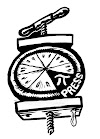
“By and large, I think writers are the best company in the world, but if they talk together too much they begin either writing the same stories, or writing for each other. A writer should write for people, not critics or other writers.” -- Louis L’Amour
I’m reading a book called The Louis L’Amour Companion, which is edited by Robert Weinberg. The opening quote is attributed to L’Amour in that book. This is something I’ve been thinking about quite a lot lately, and it was a thought underlying my “Showing versus Telling” post. Most writers are also readers, but I think we forget sometimes that most readers aren’t writers.
I know in my own work that I want the respect of other writers. I suppose that’s true in just about any career path. I imagine plumbers want to be respected by other plumbers because it lets them know that they know their stuff. But there’s a difference. Good “writing” is not necessarily the same as good “storytelling.” Good plumbing is probably pretty much the same everywhere.
In another place in the Weinberg book he points out that L’Amour never wanted to be called a novelist or an author. He wanted to be known as a storyteller. Now, I actually respect L’Amour as a “writer.” I think he could turn a neat phrase and his descriptions of the land, especially, often have some poetry in them. But it’s not for the poetry that I’ve read 99 percent of everything L’Amour ever wrote. It was the story. Often simply plotted, with stark contrasts made between good and bad, L’Amour’s western novels suck you in from word one and compel you through page after page to find out what happens next.
Consider: 1) “It was Indian country, and when our wheel busted, none of them would stop. They just rolled on by and left us setting there, my pap and me.” 2) “It is given to few people in this world to disappear twice but, as he had succeeded once, the man known as James T. Kettleman was about to make his second attempt.” 3) “He was asleep and then he was awake. His eyes flared wide and he held himself still, staring into the darkness, his ears reaching for sound.” These opening lines are from three of L’Amour’s best books, To Tame a Land (the Kindle edition is shown below, courtesy of Amazon), Flint, and Utah Blaine. But they aren’t just three of L’Amour’s best. They’re three of the best pure stories I’ve ever read, in any genre. Yet, only the last of the three is also what I consider to be good "writing" per se.

Good “writers” receive the praise of other writers and of critics. They are often loved by a devoted following. Good storytellers are often poorly received by critics but they are loved by millions of pure readers. Perhaps needlessly to say, good storytellers make far more money.
I don’t believe that good storytelling and good writing are mutually exclusive. My favorite books, like those of L’Amour, combine both elements. They are well written, with good language and poetry, and they tell an amazing story. I do think, though, that writers sometimes confuse these two skills and that we’d do well to remember that they are different, and that neither skill is inherently better. Each has its role to play in a fully realized work of fiction.
---
---







0 Yorumlar